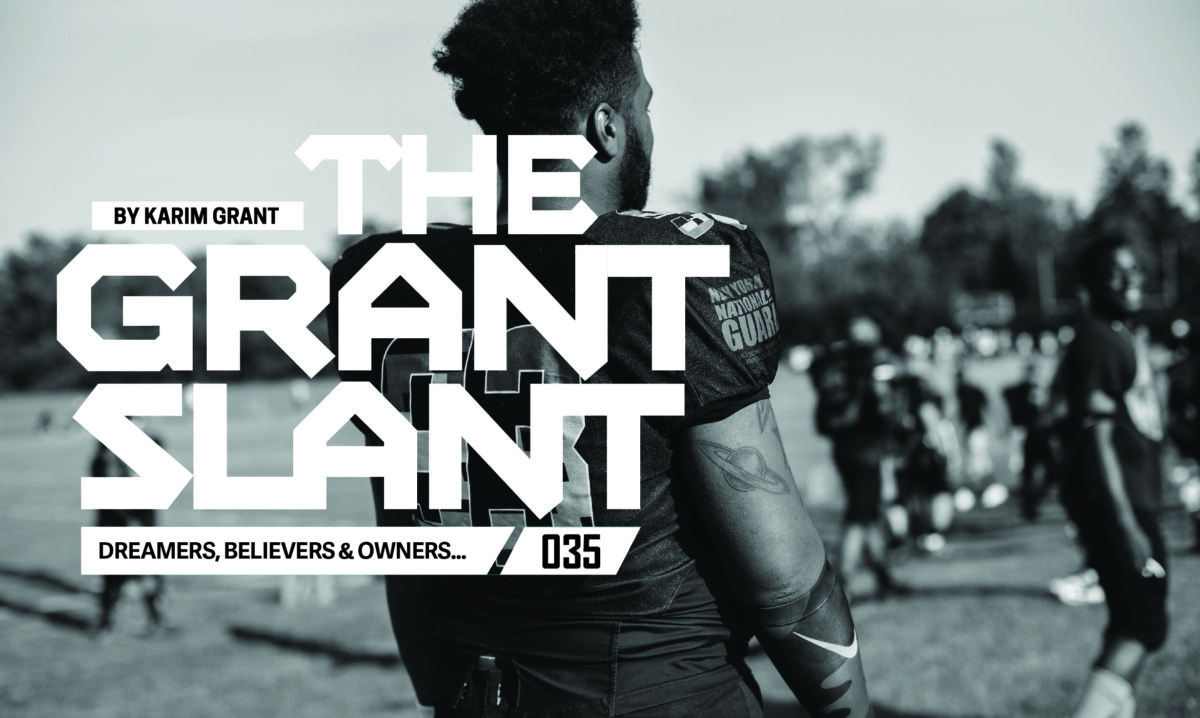As a kid growing up, learning the game of football while learning the game of life, I dreamed of one day donning the uniform of some professional football team that would undoubtedly showcase my talent for years while I provided an elaborately luxurious life for my family, especially my mother. The draw, and the allure of playing on Sundays in front of millions of adoring fans, was something any child with any semblance of talent dreamed of. At the time, my heroes were a list of future hall of famers like Thurman Thomas, Lawrence Taylor and Deion Sanders, to name a few.
Armchair and Monday Morning Quarterbacks are becoming woke.
There is a growing community of people who have unequivocally disavowed their relationship with the National Football League. While digging a little deeper beyond their superficial indifference, it’s clear that this apathy towards the NFL is due, in part, to recent issues that have dominated the headlines in the last little while.
The issues range in scope from domestic abuse, (CTE) chronic traumatic encephalopathy, and avaricious owners to the NFL’s own stance on racial injustices in the United States. There is also growing concern about the lack of racial diversity in the front office and management levels of each NFL team who represent a league that boasts almost 70 per cent of their players identify as African American. With only a very small percentage of African Americans being hired as head coaches and general managers, therein lies the problem.
In an era where racial injustice is at the forefront of minds and headlines alike, the glaring imbalances in the NFL speaks to a formidable problem that requires immediate attention.
When quarterback Colin Kaepernick began protesting the brutalization of Black people at the hands of police in the U.S. a few years ago, he could have just as easily extended his cause to the current state of affairs in his own stadium and league. A league in which Black people occupy every major positional role as players, however, unlike their white counterparts are not grandfathered into post-playing career coaching jobs. To put this simply, it’s as if the cotton-pickers, labourers, child-minders and maids, are not capable of entering into the “big house” to run the entire plantation they’ve basically constructed. Hope that didn’t go over your head.
“Clearly, we are not where we want to be on this level. We have a lot of work that’s gone into not only the Rooney Rule but our policies overall. It’s clear we need to change and do something different.”
– Roger Goodell, quoted in 2020 Associated Press news report
Let’s be clear, the NFL is fully aware of the glaring disparities that exist, as evidenced in the league’s attempt to right their wrongs by instituting the “Rooney Rule.” A statute that would force owners to alter their hiring practices by requiring every team with a head coaching vacancy to interview at least one or more candidate who is not white. Although there have been some advances, there still remains an existing gap that demonstrates a serious systemic issue.
Surprisingly enough, the NFL’s counterpart, the National Basketball Association, a league with a racial demographic that statistically favours African American players, has made adequate strides, albeit miniscule, in rectifying the disparities that existed. The NBA is not considerably better with regards to their hiring practices, as only seven of the 30 head coaches are people of colour. It does, however, pride itself on being a league that unabashedly condemns racial injustice, and allows players and coaches to use their platforms to bring light to current socio-political issues. Something the NFL could learn from as it navigates itself out of controversy surrounding Kaepernick.
Many lauded the outcome of Super Bowl LV, heralding it as “one for the ages,” as the venerable Tom Brady cruised to his seventh championship while shunning the haters that questioned his ability to lead another team to the big game at the tender age of 43. In doing so, his win also brought attention to a Tampa Bay Buccaneer coaching staff that boasted a plethora of talented, young, Black coaches who deserve just as much of the credit as Brady. The Buccaneers have also proven to be light years ahead of their time by employing not one, but two, female assistant coaches.
Tampa Bay’s recent Super Bowl success is a testament to an organization committed to unearthing talent embedded within people that have largely been omitted from consideration.
“Thank you Bruce Arians for showing the world that all 3 of your coordinators can be Black, your assistant head coach can be Black, you can have 2 full time women coaches and be the best team in the world. BA you’re a trail blazer. Leadership doesn’t have a look!”
Ryan Clark, former NFL professional, Twitter post
Fittingly during Black History Month, Tampa Bay’s most recent NFL championship has revealed to the sports world an untapped talent pool of qualified Black coaches – coaches that at one point were young people dreaming of the day when their athletic prowess isn’t the only attribute that this recognized. A day when they are judged solely by the content of their character, knowledge of the game, and most importantly not by the colour of their skin.
The NFL owes it to that small group of dreamers who have actualized a dream that I only had a brief taste of. These dreamers help to build, cultivate and expand the multi-billion-dollar conglomerate that we see today and have fed potbellied owners enough food to feed generations to come. All we are asking for is a seat at that same table. The hunger is real.
Photo by Emma Bauso from Pexels




Comments are closed.